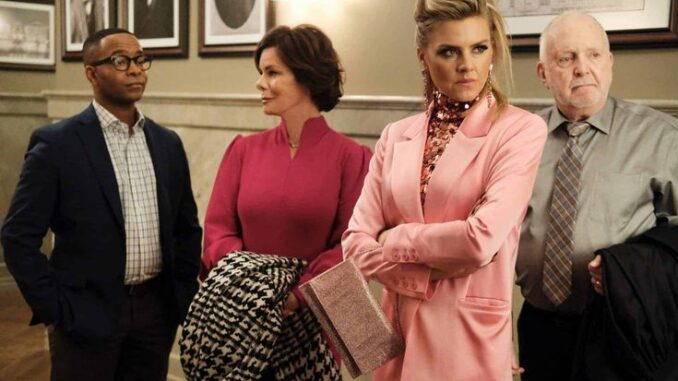
In the ever-evolving landscape of television, shows come and go, often leaving fans bewildered by abrupt cancellations. One such series that recently faced the axe is CBS’s legal dramedy, So Help Me Todd. Despite its unique blend of humor and courtroom drama, the show was discontinued after just two seasons. This article delves into the factors behind its cancellation, the reactions from its dedicated fanbase, and the broader implications within the television industry.

A Brief Overview of ‘So Help Me Todd’
So Help Me Todd debuted with a refreshing take on the legal drama genre. Starring Marcia Gay Harden as Margaret, a meticulous attorney, and Skylar Astin as Todd, her unconventional private investigator son, the show masterfully intertwined family dynamics with intriguing legal cases. This mother-son duo’s contrasting approaches to law and life provided both comedic and heartfelt moments, resonating with a diverse audience.
Initial Success and Audience Reception
Upon its premiere, the series garnered positive reviews for its witty writing and the palpable chemistry between the lead actors. Viewers appreciated the show’s ability to balance procedural elements with character-driven narratives, setting it apart from other legal dramas on air.
Ratings Performance: A Double-Edged Sword
While So Help Me Todd maintained a loyal viewership, its ratings painted a complex picture. According to reports, the show was among CBS’s lower-rated dramas. However, it’s essential to note that its viewership numbers surpassed several series on competing networks that secured renewals. This paradox raises questions about the metrics networks prioritize when deciding a show’s fate.
CBS’s Strategic Programming Decisions
The television industry is no stranger to the domino effect, where the success or failure of one show impacts others. In CBS’s case, the introduction of new dramas like NCIS: Origins, Matlock, and Watson necessitated schedule adjustments. So Help Me Todd found itself in a precarious position, especially with the emergence of Elsbeth, a show that outperformed it in the same time slot. Despite So Help Me Todd not significantly losing viewers to Elsbeth, it struggled to carve a distinct niche, leading to its vulnerability in the network’s lineup.

The Unfortunate Timing of the Cancellation
The decision to cancel So Help Me Todd came as a surprise to many, including the show’s creators. Season two concluded with a cliffhanger, a narrative choice made under the assumption of a subsequent season. Creator Scott Prendergast expressed his disappointment, highlighting that by the time they were informed of the cancellation, it was too late to alter the season’s ending.
Fan Outcry and Mobilization Efforts
The show’s abrupt end sparked a significant reaction from its fanbase. Tens of thousands rallied, signing petitions on platforms like Change.org, urging CBS to reconsider. Social media platforms buzzed with expressions of disbelief and frustration. Comments ranged from nostalgic reminiscences of the show’s impact to outright criticism of the network’s decision-making process. Despite this fervent advocacy, the network remained steadfast in its choice.
Comparative Analysis: Other CBS Cancellations
So Help Me Todd wasn’t the only show to face cancellation during this period. CBS also ended series like CSI: Vegas and NCIS: Hawai’i, both of which had commendable viewership figures. These decisions underscore a broader strategy by the network to refresh its programming slate, even at the expense of moderately successful shows.
Industry Trends: The Push for New Content
The television industry is in a constant state of flux, with networks perpetually seeking the next big hit. This drive often results in the premature ending of shows that, while performing decently, don’t align with evolving strategic objectives. The cancellation of So Help Me Todd exemplifies this trend, highlighting the challenges shows face in maintaining longevity amidst shifting network priorities.

The Role of Streaming Platforms
In an era where streaming platforms are reshaping viewership habits, traditional networks are under pressure to adapt. The competition for audience attention is fiercer than ever, prompting networks like CBS to make bold programming decisions. While So Help Me Todd is available for streaming on platforms like Paramount+, its cancellation reflects the intricate balance networks must strike between traditional broadcasting and digital offerings.
Financial Considerations and Production Costs
Beyond ratings and strategic shifts, financial factors play a pivotal role in a show’s viability. Production costs, cast salaries, and set expenses can influence decisions, especially if a network believes reallocating resources could yield better returns. While specific financial details about So Help Me Todd aren’t publicly disclosed, it’s plausible that such considerations contributed to its cancellation.
